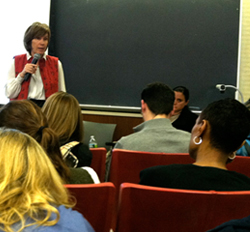TC Reading & Writing Project's 80th Saturday Reunion
Busman's Holiday: Thousands of educators attended the TC Reading & Writing Project's 80th Saturday Reunion
By Zoe Singer
“It's time for teachers to take charge of their own learning and of their own profession.”
The speaker was former TC faculty member and Obama education advisor Linda Darling Hammond. Her audience – some 3,000 educators attending the 80th Saturday Reunion of the Teachers College Reading & Writing Project, held in March – could not have been more receptive. Whether absorbing the day’s keynote address by best-children’s author Jon Scieszka, soaking up Mary Ehrenworth’s Overview of the Most Essential Units of Study in Writing, or checking out any of over 120 other workshops on offer, they had come to make common cause with their colleagues and to bring home new tools and renewed energy.
“For me to get up at 2:30 on a Saturday morning to take a bus here says a lot!” said Connecticut teacher Gail Apgar.
Founded over 25 years ago and still directed by Lucy Calkins, TC’s Robinson Professor of Children’s Literature, the Reading and Writing Project has provided curricula, coaching and other forms of professional development for schools in some 40 cities across the country. The Project’s reunions and institutes attract a loyal following, creating a sense of extended community and recognition in a profession that has often lacked for both.
Hammond, the Charles E. Ducommun Professor of Education at Stanford University, where she launched the Stanford Center for Opportunity Policy in Education and the School Redesign Network, is an iconic figure among educators on the front lines. Scieszka, National Ambassador for Young People’s Literature, brought a different kind of energy, reading excerpts from his book Knucklehead: Tall Tales and Almost True Stories of Growing up Scieszka. These included stories about peeing (on his brother, on an electric heater) a game called slaughter ball, and a broken collarbone. The implicit message: connect kids with reading material they find compelling – particularly “in February, when you’re teaching fourth grade,” said Scieszka, a former teacher.
Still, his concluding exhortation was similar to Darling-Hammond’s: “Please continue to be teachers because we are the ones who need to tell people how to be teachers.”
Calkins, who led an afternoon workshop focused on practical application of the Reading and Writing Project’s methodologies, stressed teacher’s need for collaborative growth: “So often, no one’s seeing our teaching. This is a profession, which means it can be taught and learned. It’s something we develop together and get good at together.”
She noted a redoubled sense of urgency among American educators, observing that “despite the economy, the [Reading and Writing Project’s] July institute filled faster this year than ever.”
Outside, a vendor of used children’s books on Broadway and 120th street became the afternoon’s last stop for many Saturday Reunion attendees. One woman, navigating her way out onto the street, worried about being trampled, but a friend took a different view of the crowds:
“I’m a middle school teacher, this just looks like the hallway to me.”
Published Thursday, May. 12, 2011
